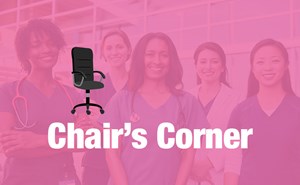
Slaying Self-Doubt
I think I might have regretted it the moment I pressed “send.”
I was right in the midst of a great second career in medicine. I had already taken what I thought was the biggest leap in life from a prior career in engineering to go back to medical school. I found my way into emergency medicine, and after residency, I launched into my academic career. I found my niche in medical education and residency leadership. A few years after becoming faculty, I was an assistant program director at the institution where I completed medical school and residency, surrounded by a team of people that I respected, trusted… and, well, that I really liked. I was comfortable, but deep down I was not really content. I had aspirations to take the next step and become a residency program director, but the reality was that the program director spot at my current institution was full and would be for the foreseeable future. Did I want to stall my own career or force myself away from my goals in order to stay comfortable?
Then, there it was in my inbox: an advertisement for the search for a program director at a well-established academic residency program in sunny southern California. It was the perfect position for my next step forward. I wrote my cover letter and dusted off my CV to send to the selection committee, but in the back of my mind I didn’t truly feel qualified. The whole exercise seemed like a fun adventure, or maybe a practice run for some undefined future time when I was actually qualified and ready. I never actually thought it was going to really happen.
At every step along the way, I kept that same train of thought. I was surprised that I got an email back from my inquiry, shocked that I got an interview, and a second one, and flabbergasted over an invitation for a third interview in Los Angeles. On the plane with my husband, I thought, “Well, this is fun. Maybe I’ll get some sunshine and see the ocean!” but somehow, I still never thought they were serious, why would they pick me?
When the job offer call came from my future boss, the Chair of our department, my actual response was, “What?! Are you serious?” I was in a state of disbelief. Immediately, I had a swirl of emotions. Regret. Anxiety. Guilt. Self-doubt. I’ve experienced this constellation of emotions before. It turns out there is a name for it. I have suffered from “imposter phenomenon” at varying levels for most of my life. It’s that belief that the real reality of your success is not through achievement and talent, but rather through trickery and luck. Essentially, feeling like you are a big, fat fraud.
Imposter phenomenon can flare up with changes in realms of life: moving to a new environment, workplace, academic setting, or social circle. If moving almost 2,000 miles to a new university in a new city with new colleagues and a new job with 10 times more responsibility than your prior one isn’t enough to kick underlying imposter phenomenon into high gear, I don’t know what would. I was entirely convinced that I was going to show up in Los Angeles and after 2 weeks I would be called into my Chair’s office and asked to step down because I obtained the job on false pretenses.
Despite the giant pit in my stomach, I packed up my life and moved west. The adjustment was difficult. I’d be lying if I said otherwise. There were days and weeks and months where I didn’t know if I made the right decision. I made mistakes. I ran into political battles I didn’t see coming. I dealt with disappointment over ideas that didn’t come to fruition. I got lost. A lot. I spent a lot of time alone without my social support system. I wondered if I ruined my family’s life. I definitely cried. But I didn’t get fired.
Sitting here just over 3 years in the job, I can reflect on how much I’ve been able to accomplish both professionally and personally. I developed my resilience by keeping the vision of my overall goal to become a program director. I reached out to family, friends, and mentors for support. I actually talked about my fraudulent feelings and found out that I was in good company. I made a conscious effort to reframe negative thoughts to what was true, rather than falling into the false narrative of being “lucky” instead of qualified. I have grown a community and support system where I am, and I have met some incredible people along the way. Going through this process has made me a better program director than I would have been if I stayed behind. I have real empathy for how disorienting going through residency can be. I learned the lesson that just because you know you want something, in the end doesn’t mean that it isn’t incredibly hard or that you won’t question yourself along the way. I don’t think that my imposter syndrome will ever completely go away, but I have learned that it may ebb and flow, and I have learned how to tame it. I have proven to myself that I can handle it. That is growth.
By Rebecca A. Bavolek, MD, FACEP, FAAEM




